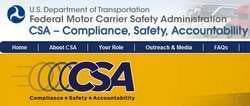
The Federal Motor Carrier Safety Administration should update Congress regularly on executing its Compliance Safety Accountability program, which would benefit from creating a driver fitness ratings implementation timetable, a federal oversight agency reported.
The Government Accountability Office advised FMCSA to report to Congress routinely on CSA implementation issues and how it would mitigate any connected risks. It also should develop a reasonable timeframe to put driver fitness ratings into effect. The agency told GAO it would consider the recommendations.
In 2009, Congress had asked GAO to monitor the program’s implementation, and the office conducted the performance audit through the end of last month.
FMCSA had indicated consideration of implementing driver fitness ratings, but confirmed this intention to GAO Sept. 23. The agency is seeking clarification on its authority to prohibit drivers, if determined to be unfit based on ratings, from operating in interstate commerce. It believes it has this authority but is seeking congressional clarification as part of the next surface transportation reauthorization. The most recent extension of that funding expires March 31.
FMCSA has prioritized implementing carrier oversight activities, agency officials told GAO. Also, FMCSA now have more driver data than before, so implementing the driver component is not as critical to CSA’s ability to improve safety as the agency had believed when designing the program.
Delays are routine when adding a major program such as CSA, but FMCSA has carried out most CSA oversight activities and briefed congressional staff on CSA periodically, agency representatives said.
GAO responded the FMCSA still lacks a comprehensive document specifically outlining status, implementation delays and identifying risks associated with these problems and strategies to mitigate them. The agency’s execution issues included delays in development of technology that is needed for new interventions and staff resistance to shifting to a new system of reviewing carrier operations.
CSA replaced SafeStat with the Safety Measurement System to identify high-risk carriers. Nearly a year after the anticipated completion date, FMCSA partially has implemented two of the three CSA carrier oversight activities, the new SMS and an expanded set of intervention in every state. “However, it still cannot use CSA safety ratings to get unsafe carriers off the road because it has not completed a rulemaking needed to do so,” GAO stated.
FMCSA has added most of the expanded enforcement interventions for at-risk carriers. But it has delayed implementation of two interventions, Offsite Investigations and Cooperative Safety Plans, because the technology necessary will not be completed until at least 2012.
FMCSA has not started using SMS data to suspend unfit carriers. It is two years behind in issuing and completing rulemaking needed to use this instead of time-consuming compliance reviews. The agency expects to have a final rulemaking in 2013.
State enforcement agencies have had difficulty handling carriers’ requests to review violations data through FMCSA’s DataQs system. Although carriers previously could request reviews of violations data through the DataQs system, SafeStat focused on only certain violations. CSA uses all violations to determine carriers’ SMS scores and has made an expanded range of data available to carriers, resulting in trucking companies taking greater interest.
In 2004, FMCSA began developing CSA, which cost $30 million for fiscal years 2007-2010. The agency has requested $78 million from Congress to fully implement and integrate CSA into its operations, which includes new positions.











